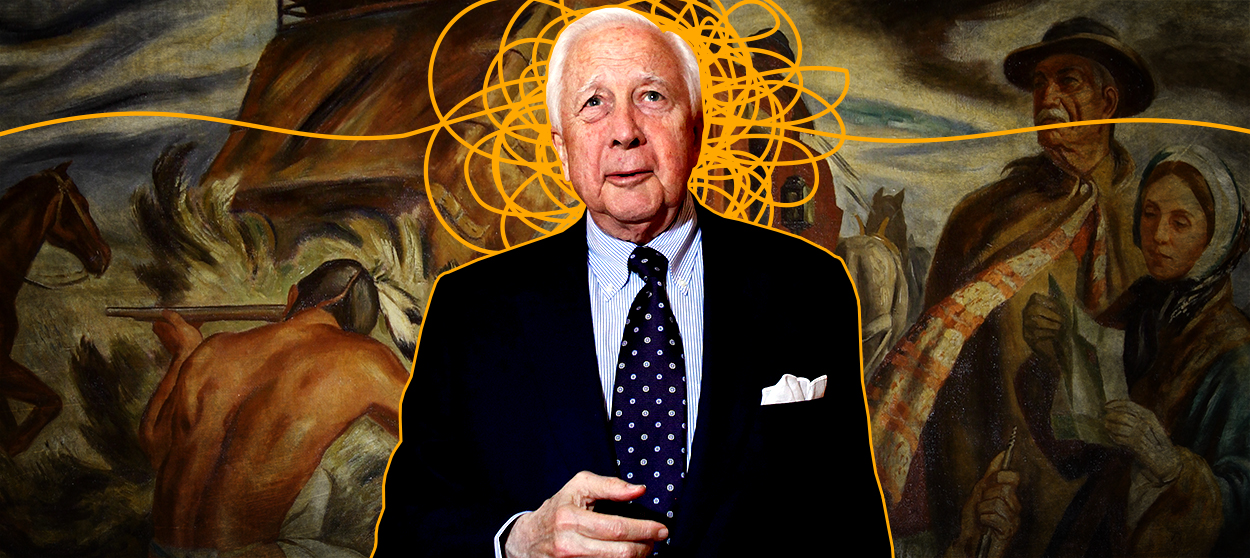Don't buy your dad the new David McCullough book for Father's Day
The Pioneers is the whitewashed history lesson America doesn't need


A free daily email with the biggest news stories of the day – and the best features from TheWeek.com
You are now subscribed
Your newsletter sign-up was successful
All across the country next weekend, thousands of men will open their Father's Day gifts to find David McCullough's new book, The Pioneers. McCullough, the author of more than a dozen books and the winner of two Pulitzer Prizes, may be America's most famous popular historian. Like most of his books, The Pioneers has staked its claim near the top of bestseller lists since its publication in early May.
The Pioneers tells the story of the nation's westward expansion in the late eighteenth and early nineteenth century, focusing on the settlement of Marietta, Ohio and the larger Northwest Territory. The book's subtitle, "The Heroic Story of the Settlers Who Brought the American Ideal West," gives you a sense of the book's thesis. And also its appeal.
McCullough appears to have written the perfect dad book. A sweeping narrative of decent, hardworking men who built this nation that also reminds us of our better selves — and the moral bearings to which the United States must rededicate itself. Given the state of the nation — and, especially, the health (or not) of the American ideal in 2019 — The Pioneers might seem the needed balm for our ravaged age. If ever there were a time for heroes, surely it is now.
The Week
Escape your echo chamber. Get the facts behind the news, plus analysis from multiple perspectives.

Sign up for The Week's Free Newsletters
From our morning news briefing to a weekly Good News Newsletter, get the best of The Week delivered directly to your inbox.
From our morning news briefing to a weekly Good News Newsletter, get the best of The Week delivered directly to your inbox.
But that romantic view is the book's very danger.
The problem of McCullough's story owes to how closely it reflects, even if unintentionally, the white nationalist myth that undergirds Trumpism. The Pioneers highlights the story of a handful of white settlers, men who McCullough describes in the book's acknowledgments as "entirely unknown to most Americans." His publisher, Simon and Schuster, has similarly hyped the book, and some reviews have joined in. NPR's book critic, for example, hailed the book as a "fascinating look at a chapter in American history that's been somewhat neglected in the country's popular imagination."
That's probably true. It also misses the point. The Pioneers does tell the story of white guys, like Rufus Putnam and Ephraim Cutler, most Americans have never heard of. McCullough writes that his purpose was to bring such characters "to life, bring them center stage and tell their amazing and, I feel, important story."
Uncovering the unknown, including unrecognized historical actors, remains a primary task for all historians. But bringing un-famous white men into the spotlight, doesn't provide a new understanding of history. Instead, it perpetuates and — particularly in this moment — reinvigorates persistent national myths that make white people the center of the American experience and the chosen beneficiaries of democracy's offerings.
A free daily email with the biggest news stories of the day – and the best features from TheWeek.com
More importantly, McCullough largely banishes Native Americans — tribes like the Wyandot and Delaware — to the outskirts of the area and the margins of his story. As Rebecca Onion at Slate has already expertly argued, in McCullough's telling, the Native peoples only exist as a curious challenge to the pioneers' ambitions, not as the original occupants of the region itself. (She also comments persuasively on the book's poor handling of African-American history and its avoidance of Ohio's legacy of anti-black racism.)
Many other historians, including Patricia Limerick, Richard Slotkin, and Richard White, to name just a few, have spent the last several decades uncovering the violence, conflict, expropriation, racial subjugation, and environmental devastation that marked white settlers' westward movement. Their work has centered the experiences of non-white people, and laudably complicated the popular "Manifest Destiny" narrative that has long been taught in American History textbooks.
Yet, as groundbreaking and influential as those historians have been, none have enjoyed McCullough's popularity or his fat royalty checks. Most Americans don't want to read those histories, in part because they disrupt the very stories we keep telling ourselves about who we are. This unwillingness to reckon with a past that was often as awful as it was awesome, though, allows someone like Trump to exploit the worst impulses of popular memory for his political gain.
Certainly, McCullough is no fan of Trump. As Trump campaigned for office in 2016, McCullough pronounced him "a monstrous clown with a monstrous ego." Of course, you don't have to be an award-winning biographer to judge Trump so correctly — many of McCullough's readers surely oppose the president's racist rhetoric and policies too — but it doesn't hurt. Since then, McCullough has maintained his criticisms of Trump as an existential threat to American democracy.
McCullough is right. Yet Trump is more symptom than cause of what is ailing the American project. And his rise to power depended, in part, on glorified, whitewashed notions of the past that McCullough is now helping to keep alive, even if in softer form. When Trump bellowed he would make America great again, he was tapping into the sort of hazy nostalgia that popular histories like The Pioneers have done nothing to dismantle.
If anything, the Trump presidency has made plain the double-edged sword of history: both how dangerously false notions of the past can be weaponized but also how powerfully deep historical knowledge can hold anti-democratic tendencies in check. What we need now is not the "right" version of history, as if such a thing could exist. Rather, we must continue to populate our national memory with the full richness and complexity of its many peoples. Doing so will get us closer to the truths of the past. For several decades, pioneering historians have done exactly that. McCullough, unfortunately, is not one of them.
Neil J. Young is a historian and the author of We Gather Together: The Religious Right and the Problem of Interfaith Politics. He writes frequently on American politics, culture, and religion for publications including The New York Times, The Atlantic, the Los Angeles Times, HuffPost, Vox, and Politico. He co-hosts the history podcast Past Present.
-
 Local elections 2026: where are they and who is expected to win?
Local elections 2026: where are they and who is expected to win?The Explainer Labour is braced for heavy losses and U-turn on postponing some council elections hasn’t helped the party’s prospects
-
 6 of the world’s most accessible destinations
6 of the world’s most accessible destinationsThe Week Recommends Experience all of Berlin, Singapore and Sydney
-
 How the FCC’s ‘equal time’ rule works
How the FCC’s ‘equal time’ rule worksIn the Spotlight The law is at the heart of the Colbert-CBS conflict
